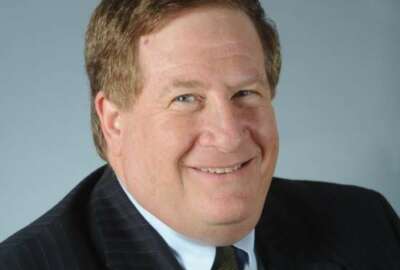

The election outcome will have big consequences for nearly every segment of the economy, including federal contractors and the rules they and the government operate...
Best listening experience is on Chrome, Firefox or Safari. Subscribe to Federal Drive’s daily audio interviews on Apple Podcasts or PodcastOne.
Today’s vote, in reality the vote that’s been going on for weeks and may continue longer for weeks, will have big consequences for nearly every segment of the economy, including federal contractors and the rules they and the government operate under. For what contractors are hoping for from the next administration, the Federal Drive with Tom Temin turned to the president and CEO of the Professional Services Council, David Berteau.
Interview transcript:
Tom Temin: David, good to have you back. And as we await returns, and who knows if we’ll even know tomorrow morning who the next President will be, what is it that the industry is looking for in terms of the ground rules?
David Berteau: Well, Tom, good morning, and it is Election Day. And of course, one of the things we’ve learned at PSC over the years is we have to be ready for all possible outcomes, right, both in terms of the White House and also in terms of the Senate and and the House of Representatives, even if the odds are slim that a certain outcome will come, we’ve got to be prepared for that, no matter what. So, that’s what we spend our time doing. And the initiatives that we’re working on fall into, really, two categories. The broadest ones are, whatever the outcomes are, these are important matters for for contracting and for our contractors. And then there might be some specific, depending on who would win. Even if the incumbent wins a second term, history shows that there’s a lot of turnover: There’s a whole new agenda, there’s a whole new set of people, and right now, we don’t know who that’s going to be. So, one of the key things that we want to focus on, really, is how does America get back to a government that functions better and a government that they can actually trust? One of the things we learned, actually, in the partial government shutdown a couple of years ago, is that a lot of Americans don’t even really realize everything government does, until they stop doing it. Right. And so that’s a big issue there. And I think we’ve got a number of initiatives that we want to put forth that would help move all of America in that direction, not just our member companies.
Tom Temin: One of the things we learned in the pandemic is that, yes, government is capable of spending a lot of money on response. But the response really depended so much on contracted work. So there’s a good example of, if you’re going to have a policy that gets carried out properly, government and industry really are one entity in that sense.
David Berteau: Absolutely. I think we’ve seen a couple of real positive lessons grow out of the COVID-19 response, right. One is that government and business can collaborate and cooperate much, but it really is a better-cemented partnership, I think, recognized by all on both sides going forward. And we moved into that so quickly. And part of it was due to good leadership, OMB and the Office of Federal Procurement Policy, putting out some key memoranda right at the front end, Defense Department and GSA and other agencies doing the same thing. And then implementing those, because good ideas don’t self-implement. They’ve actually got to be implemented by thousands of contracting officers and program managers across the government, and contractors have to fill in there as well. And we saw all of that work in the response to COVID-19.
Tom Temin: And on some specific ideas, of course, if we can presume that regardless of whether Mr. Trump or Mr. Biden is elected, the pandemic will still be with us. And so there are specifics like extending Provision 3610 to keep contractors available engaged, that you’re looking for.
David Berteau: Absolutely. And uncertainty is the bane of successful contracting, right, because ultimately, contractors perform the contracts they negotiate and sign. And the government can only do that which they know they have funding for. So first and foremost, it’s actually for Congress and the administration to put in place the full-year appropriations for FY ’21. We’re operating under a continuing resolution now. It goes through December 11. We know what the final numbers are going to look like. It doesn’t make any sense for Congress not to enact those and the president to sign it. And inside that clearly needs to be an extension of Section 3610, that special authority that allows companies to be reimbursed to keep employees on the payroll. With or without additional funding, that authority is absolutely central going forward, because you’re right, COVID-19’s going to be with us for awhile.
Tom Temin: We’re speaking with David Berteau, President and CEO of the Professional Services Council. And there’s a couple of other things pending, like the Trusted Workforce 2.0, the whole issue of the Management Act and modernization. Those are still works in progress.
David Berteau: Very much still works in progress. The House has put forward an extension of the Modernizing Government Technology Act. And that’s pretty essential. But the real power there is in those agencies that have already set up their working capital funds, where they’re financing modernization through the savings that come from getting rid of wasteful and ancient legacy systems. And we can do so much more in that regard, agency after agency. There are barriers to this. Some of the budget guys don’t like it, some of the appropriators don’t like it. But the benefits so far outweigh any of the concerns. That’s a really powerful initiative going forward. Trusted Workforce 2.0 is a whole new way of approaching the cleared workforce as well as those who are trusted, but not necessarily classified material into the agencies, and particularly the idea of continuous vetting and continuous evaluation. So we don’t wait for five or 10 years to go by before we find the next Edward Snowden. We find them in real time as we’re going through. It has enormous prospects for success there, but needs a lot of implementation focus.
Tom Temin: In the procurement system, the acquisition itself is like a gigantic orchestra that is always being tinkered with. We call it acquisition reform. But what are you seeing, from your standpoint, that should be the next round of acquisition tinkering? I don’t want to say reform, because it’s not going to, basically, go away, that you have competition for government contracts. But what do you see as the next set of changes?
David Berteau: There are two dynamics to this. At one end, you have Congress continuing to put lots of new legislation in place. And of course, I omitted when I talked about the need for fiscal year appropriations for FY ’21, we also, of course, need the National Defense Authorization Act for Fiscal Year 21. It’s essential to so much that the government does, not just DoD, but governmentwide. But it always has new provisions that will change the acquisition rules, even though we haven’t finished implementing the ones from the previous years’ bills. And sometimes they’re not even consistent with one another. So that part’s got to be cleaned up. But at the other end, what we’ve seen under COVID-19, is a very powerful recognition that the acquisition process, when you follow all the rules, is just too slow. But if you look at DoD, for instance, they’ve spent about $16 billion on COVID-19. And almost half of that has been done not through FAR-based contracts, if you’re using the regular Federal Acquisition Regulations, but through OTA, the Other Transaction Authority. What that says is, if you really need it, the system doesn’t work that well. Now the system works pretty well as long as you’re stable, but in times of change we ought to take advantage of that. If we can fix it for some parts of the acquisition process, we ought to be able to fix it for all the parts of the acquisition process. That’s a big opportunity for the next term.
Tom Temin: I think it’s safe to say that on the Democratic side, there’s more interest in taking a closer look at OTAs than perhaps on the Republican side. And so if there’s a switch there, then that could come under fresh scrutiny, I think.
David Berteau: I think as you point out, there could be some ways in which we pursue these initiatives that are a little different, depending on who’s in what position and whether the Senate is in Republican majority or Democratic majority. But the fundamental drive, which is we need an acquisition system that can be responsive, agile, and can retain the workforce and the contracting base that we need to have to get the government going. That’s important.
Tom Temin: And another instrument that is used differently, depending on whether Democrats are in control or Republicans are in control is the Office of Federal Contract Compliance Programs, part of the Labor Department. And you’ve seen very wide swings in that offices approach, say, between the Obama administration and the Trump administration. So that could be headed in either direction. We don’t know yet. What would you hope for from OFCCP?
David Berteau: Well, the first thing is, there are statutes already in place, equal opportunity laws, the Civil Rights Act extended through Executive Order 11246, more than more than 50 years ago now, where the role of the Office of Federal Contract Compliance Programs is absolutely essential in terms of both rewarding contractors who comply with the law and recognizing those who don’t and taking care of that. And we’ve always advocated for an appropriate level of of enforcement in that agency. But I think also it can go a little beyond that if we’re not careful, right, to where you’re starting to play politics in that kind of compliance and enforcement. And we’ve seen that from both administrations, both the fair pay and safe workplaces executive order in the previous administration, and now of course, Executive Order 13950, the combating race and sex stereotyping, which has essentially put a chill into essential diversity and inclusion training that companies need to have in order to recruit the workforce they need.
Tom Temin: All right, so a lot to look forward to. Again, we don’t know as we speak now, but let’s hope for the best for the nation. David Berteau is president and CEO of the Professional Services Council. Thanks so much.
David Berteau: Thank you, Tom. And we’ll catch up with these when we actually know the outcome.
Tom Temin: All right, you bet.
Copyright © 2025 Federal News Network. All rights reserved. This website is not intended for users located within the European Economic Area.
Tom Temin is host of the Federal Drive and has been providing insight on federal technology and management issues for more than 30 years.
Follow @tteminWFED



